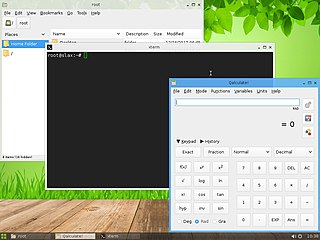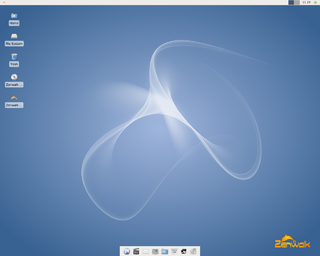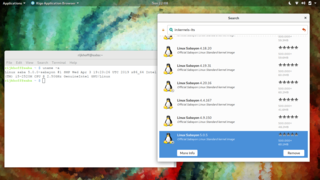Related Research Articles

A Linux distribution is an operating system made from a software collection that includes the Linux kernel and, often, a package management system. Linux users usually obtain their operating system by downloading one of the Linux distributions, which are available for a wide variety of systems ranging from embedded devices and personal computers to powerful supercomputers.

Mandriva Linux is a discontinued Linux distribution developed by Mandriva S.A.

Damn Small Linux (DSL) was a computer operating system for the x86 family of personal computers. It is free and open-source software under the terms of the GNU GPL and other free and open source licenses. It was designed to run graphical user interface applications on older PC hardware, for example, machines with 486 and early Pentium microprocessors and very little random-access memory (RAM). DSL is a Live CD with a size of 50 megabytes (MB). What originally began as an experiment to see how much software could fit in 50 MB eventually became a full Linux distribution. It can be installed on storage media with small capacities, like bootable business cards, USB flash drives, various memory cards, and Zip drives.

Slax is a LiveCD Linux distribution developed by Tomáš Matějíček and based on Debian. Packages can be added by apt package manager or can be prepared as modules. The tagline for Slax refers to itself as "your pocket operating system".

Berry Linux is a Live CD Linux distribution that has English and Japanese support. Berry Linux is based on and is compatible with Fedora 20 packages. The distribution is primarily focused on use as a Live CD, but it can also be installed to a live USB drive. Berry Linux can be used to try out and showcase Linux, for educational purposes, or as a rescue system, without the need to make changes to a hard disk. The current version is 1.35 released on 7 July 2021.

PCLinuxOS, often shortened to PCLOS, is an x86-64 Linux distribution, with KDE Plasma Desktop, MATE and XFCE as its default user interfaces. It is a primarily free software operating system for personal computers aimed at ease of use. It is considered a rolling release.

SuperTux is a free and open-source two-dimensional platform video game published under the GNU General Public License (GPL). The game was inspired by Nintendo's Super Mario Bros. series; instead of Mario, the hero in the game is Tux, the official mascot of the Linux kernel.

Puppy Linux is an operating system and family of light-weight Linux distributions that focus on ease of use and minimal memory footprint. The entire system can be run from random-access memory (RAM) with current versions generally taking up about 600 MB (64-bit), 300 MB (32-bit), allowing the boot medium to be removed after the operating system has started. Applications such as AbiWord, Gnumeric and MPlayer are included, along with a choice of lightweight web browsers and a utility for downloading other packages. The distribution was originally developed by Barry Kauler and other members of the community, until Kauler retired in 2013. The tool Woof can build a Puppy Linux distribution from the binary packages of other Linux distributions.

VectorLinux, abbreviated VL, is a Linux distribution for the x86 platform based on the Slackware Linux distribution, originally developed by Canadian developers Robert S. Lange and Darell Stavem. Since version 7 the Standard Edition is also available for the x86-64 platform, known as VLocity64 7.

Zenwalk is a Desktop focused Linux distribution founded by Jean-Philippe Guillemin. It is based on Slackware with very few modifications at system level making it 100% compatible with it. Zenwalk aims to be a modern and multi-purpose Linux distribution by focusing on Internet applications, multimedia and programming tools. Additionally, Zenwalk comes with many specialized tools, designed for beginner through advanced users as it offers system configuration via both graphical and command-line operations.

Edubuntu, previously known as Ubuntu Education Edition, was an official derivative of the Ubuntu operating system designed for use in classrooms inside schools, homes and communities.

Sabayon Linux or Sabayon, was a Gentoo-based Italian Linux distribution created by Fabio Erculiani and the Sabayon development team. Sabayon followed the "out of the box" philosophy, aiming to give the user a wide number of applications ready to use and a self-configured operating system.

Korora was a remix of the Fedora Linux distribution. Originally Kororaa was a binary installation method for Gentoo Linux which aimed for easy installation of a Gentoo system by using install scripts instead of manual configuration. The name derives from the Māori word kororā – the little penguin.

Trisquel is a computer operating system, a Linux distribution, derived from another distribution, Ubuntu. The project aims for a fully free software system without proprietary software or firmware and uses a version of Ubuntu's modified kernel, with the non-free code removed. Trisquel relies on user donations. Its logo is a triskelion, a Celtic symbol. Trisquel is listed by the Free Software Foundation as a distribution that contains only free software.

SuperTuxKart (STK) is a free and open-source kart racing game, distributed under the terms of the GNU General Public License, version 3. It features mascots of various open-source projects. SuperTuxKart is cross-platform, running on Linux, macOS, Windows, iOS (beta), Android systems and Nintendo Switch (homebrew).

Tux is a penguin character and the official brand character of the Linux kernel. Originally created as an entry to a Linux logo competition, Tux is the most commonly used icon for Linux, although different Linux distributions depict Tux in various styles. The character is used in many other Linux programs and as a general symbol of Linux.

Porteus is a portable operating system based on Slackware. It does not require installation and can be run from fixed and removable media, such as a USB flash drive or compact disc.

Platypux was a French Linux distribution of the Slackware family, developed by Pierre-Aimé and Jacques-Olivier.

Kwort is a Linux distribution, based on CRUX. Kwort's desktop environment is Openbox.
References
- ↑ Get your game on with SuperGamer-1 TuxMachines, April 8, 2006
- ↑ With new code base, Supergamer is fun again Linux.com, July 18, 2007[ dead link ]
- ↑ SuperGamer Live DVD Archived 2009-08-05 at the Wayback Machine Desktop Linux Reviews, August 3, 2009
- ↑ SuperGamer: World’s first Dual Layer Live DVD Techie Buzz, January 14, 2010
- ↑ SuperGamer - Dedicated live Linux gaming DVD - BOOM! Dedoimedo, December 3, 2010 (Article by Igor Ljubunci)
- ↑ Direct Downloads SuperGamr Forums, July 18, 2010 Archived July 25, 2010, at the Wayback Machine
- ↑ Supreme SuperGamer 2 SuperGamer Forums, July 16, 2010 Archived July 22, 2010, at the Wayback Machine
- ↑ SuperGamer, 8GB of Linux-Only Gameplay Linux Journal, January 14, 2010
- ↑ Supreme SuperGamer : A super Linux distro for gamers Techno 360, July 26, 2009
- ↑ "SuperGamer". www.supergamer.x10host.com. Retrieved 2020-11-04.
- ↑ How-to Become a Linux Gamer Linux Journal, April 29, 2010